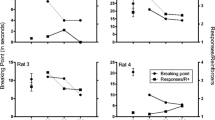Abstract
In two experiments the effects of a range of doses of morphine (1, 3, 10 and 30 mg/kg) on the food and water consumption of rats were studied. The results of the first experiment showed that in 24 h food-deprived rats, morphine reduced levels of food and water intake. The duration of these actions was dependent upon dose, with only the highest dose (30 mg/kg) producing any effect persisting for longer than 4 h. In contrast a second experiment showed that morphine increased levels of food and water intake in non-deprived animals. The effect on food intake was most apparent when measurements were taken at 2 h and 4 h after drug administration, while water intake remained above control levels for over 6 h. This study shows that the actions of morphine on ingestion of food and water are affected by food deprivation, and the results are consistent with the hypothesised role of endogenous opiates in the mediation of such behaviour.
Similar content being viewed by others
References
Belluzzi JD, Stein L (1978) Do enkephalin systems mediate drive reduction? Soc Neurosci Abs 8:405
Brown DR, Blank MS, Holtzman SG (1980) Suppression by naloxone of water intake induced by deprivation and hypertonic saline in intact and hypophysectomised rats. Life Sci 26:1535–1542
Brown DR, Holtzman SG (1979) Suppression of deprivation-induced food and water intake in rats and mice by naloxone. Pharmacol Biochem Behav 11:567–573
Brown DR, Holtzman SG (1980) Evidence that opiate receptors mediate suppression of hypertonic saline-induced drinking in the mouse by narcotic antagonists. Life Sci 26:1543–1550
Chance WT, Rosecrans JA (1977) Inhibition of drinking by intrahypothalamic administration of morphine. Nature 270:167–168
Cooper SJ (1980a) Naloxone: Effects on food and water consumption in the non-deprived and deprived rat. Psychopharmacology 71:1–6
Cooper SJ (1980b) Benzodiazepines as appetite-enhancing compounds. Appetite 1 (in press)
Frenk H, Rogers GH (1979) The suppressant effects of naloxone on food and water intake in the rat. Behav Neural Biol 26:23–40
Grandison S, Guidotti A (1977) Stimulation of food intake by muscimol and beta endorphin. Neuropharmacology 16:533–536
Holtzman SG (1974) Behavioral effects of separate and combined administration of naloxone and d-amphetamine. J Pharmacol Exp Ther 189:51–60
Holtzman SG (1979) Suppression of appetitive behavior in the rat by naloxone: lack of effect of prior morphine dependence. Life Sci 24:219–226
Hughes J, Smith TW, Kosterlitz HW, Fothergill LA, Morgan BA, Morris HR (1975) Indentification of two related pentapeptides from the brain with potent opiate agonist activity. Nature 258:577–579
King BM, Castellanos FX, Kastin AJ, Berzas MC, Mauk MD, Olson GA, Olson RD (1979) Naloxone-induced suppression of food intake in normal and hypothalamic obese rats. Pharmacol. Biochem Behav 11:729–732
Kumar R, Mitchell E, Stolerman IP (1971) Disturbed patterns of behaviour in morphine tolerant and abstinent rats. Br J Pharmacol 42:473–484
Maickel RP, Braude MC, Zabik JE (1977) The effects of various narcotic agonists and antagonists on deprivation-induced fluid consumption. Neuropharmacology 16:863–866
Margules DL (1979) Beta-endorphin and endoloxone: Hormones of the autonomic nervous system for the conservation or expenditure of bodily resources and energy in anticipation of famine or feast. Neurosci Biobehav Rev 3:155–162
Margules DL, Moisset B, Lewis MJ, Shibuya H, Pert CB (1978) Beta-endorphin is associated with overeating in genetically obsese mice (ob/ob) and rats (fa/fa). Science 202:988–991
Marks-Kaufman R, Kanarek RB (1980) Morphine selectively influences macronutrient intake in the rat. Pharmacol Biochem Behav 12:427–430
Olson GA, Olson RD, Kastin AJ, Coy DH (1979) Endogenous opiates: Through 1978. Neurosci Biobehav Rev 3:285–299
Ostrowski NL, Foley TL, Lind MD, Reid LD (1980) Naloxone reduces fluid intake: Effects of water and food deprivation. Pharmacol Biochem Behav 12:431–435
Sanger DJ, McCarthy PS, Metcalf G (1980) The effects of opiate antagonists on food intake are stereospecific. Neuropharmacology (in press)
Schulz R, Wuster M, Herz A (1980) Interaction of amphetamine and naloxone in feeding behavior in guinea pigs. Eur J Pharmacol 63:313–319
Stapleton JM, Ostrowski NL, Merriman VJ, Lind MD, Reid LD (1979) Naloxone reduces fluid consumption in water-deprived and nondeprived rats. Bull Psychon Soc 13:237–239
Author information
Authors and Affiliations
Rights and permissions
About this article
Cite this article
Sanger, D.J., McCarthy, P.S. Differential effects of morphine on food and water intake in food deprived and freely-feeding rats. Psychopharmacology 72, 103–106 (1980). https://doi.org/10.1007/BF00433813
Received:
Issue Date:
DOI: https://doi.org/10.1007/BF00433813




